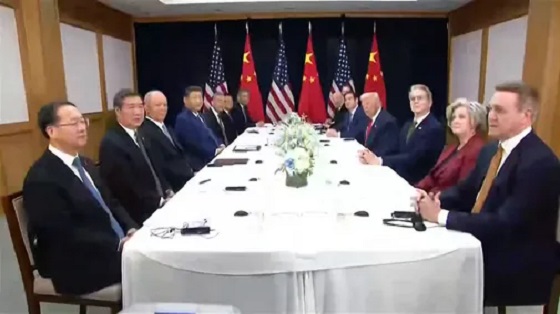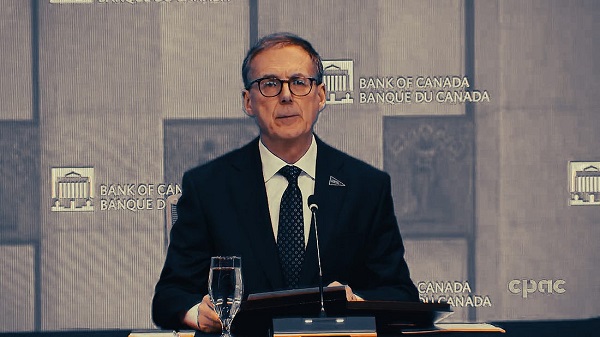International
Trump and Xi meet in South Korea, signal thaw after year of tariff wars

President Trump and Chinese President Xi Jinping met Thursday in South Korea for their first summit since Trump’s return to the White House, striking a tone of cautious optimism as they sought to cool trade tensions that have strained relations between the world’s two largest economies. Meeting at a South Korean air base, the two leaders exchanged warm greetings and spoke positively about finding common ground after a year of tariff battles. “Great pleasure to see you again,” Xi told Trump as cameras flashed. Trump responded that he expected a “very successful meeting” and predicted a “great understanding” between the two sides.
.@POTUS meets with Chinese President Xi Jinping for the first time since 2019: "It's a great honor… I think we're going to have a fantastic relationship for a long period of time — and it's an honor to have you with us." pic.twitter.com/ueW2gvMcCy
— Rapid Response 47 (@RapidResponse47) October 30, 2025
Xi, speaking through an interpreter, praised Trump’s leadership and said China’s progress “goes hand in hand with your vision to make America great again.” He emphasized that both nations could “help each other succeed and prosper together,” framing the talks as a step toward renewed partnership rather than rivalry. The meeting followed weeks of negotiations between U.S. and Chinese trade officials, who had reached a “basic consensus” on key issues in advance. Xi noted that the talks yielded “encouraging progress” on “major concerns” for both nations and even commended Trump’s role in mediating other global disputes, including conflicts in the Middle East and Southeast Asia.
According to U.S. officials, Trump’s team has signaled readiness to scale back select trade duties if Beijing meets enforcement commitments. The president is expected to ease some of those measures in exchange for China’s one-year suspension of export restrictions on rare-earth and critical minerals — materials vital to American manufacturing. In return, Beijing will reportedly intensify efforts to curb fentanyl smuggling, which U.S. data shows has contributed to roughly one in every 1,000 American deaths over the past five years. China is also preparing to resume large-scale soybean purchases, reversing retaliatory tariffs that hit U.S. farmers earlier this year.
While Trump acknowledged Xi as a “tough negotiator,” he told reporters he had “no doubt” the summit would deliver results. The meeting — framed around mutual economic relief and renewed cooperation — marked a rare bright spot in a relationship defined by tariffs, tech restrictions, and strategic competition. Whether the goodwill in Seoul translates into lasting policy changes remains to be seen, but Thursday’s encounter suggested both leaders are eager to ease tensions and show progress after a bruising trade standoff.
Health
Leslyn Lewis urges Canadians to fight WHO pandemic treaty before it’s legally binding

From LifeSiteNews
Conservative MP Leslyn Lewis is urging Canadians to demand a parliamentary debate on the WHO Pandemic Agreement, highlighting risks to national sovereignty.
Conservative Member of Parliament (MP) Leslyn Lewis called on Canadians to petition against the World Health Organization’s (WHO) pandemic treaty before it becomes legally binding.
In an October 23 post on X, Lewis encouraged Canadians to demand that politicians debate the WHO Pandemic Agreement before it becomes law after warnings that the treaty could undermine national freedom and lead to global surveillance.
“I have raised red flags about its implications on Canada’s health sovereignty and the federal government’s willingness to enter a legally binding treaty of this weight without any input from Parliament,” she declared.
In May, Canada, under Liberal Prime Minister Mark Carney, adopted the treaty despite warnings that the agreement gives the globalist entity increased power in the event of another “pandemic.”
However, Lewis revealed that since the agreement has yet to be officially signed, Canada is not bound to it and can still make amendments.
“We are now in a critical window of opportunity to ask tough questions and debate the treaty before it is signed by the Minister of Foreign Affairs and binds our nation,” she explained.
Lewis encouraged Canadians to sign a petition calling for a debate of the agreement as well as contacting their local MPs to request a parliamentary review of the treaty.
Lewis revealed that Canadians’ persistent opposition to the treaty has already resulted in some of the more dangerous clauses, including restricting free speech, freedom of movement, and government surveillance, being removed from the final agreement.
“Thanks to the engagement of countless Canadians and concerned citizens around the world, the most extreme provisions in the WHO Pandemic Treaty were removed — these measures would have undermined national healthcare sovereignty and given international bureaucrats sweeping powers,” Lewis declared.
“The removal of provisions on vaccine mandates, misinformation and disinformation, censorship requirements, travel restrictions, global surveillance, and mandatory health measures happened because people paid attention and spoke up,” she continued.
Among the most criticized parts of the agreement is the affirmation that “the World Health Organization is the directing and coordinating authority on international health work, including on pandemic prevention, preparedness and response.”
While the agreement claims to uphold “the principle of the sovereignty of States in addressing public health matters,” it also calls for a globally unified response in the event of a pandemic, stating plainly that “(t)he Parties shall promote a One Health approach for pandemic prevention, preparedness and response.”
Business
Bill Gates walks away from the climate cult

Billionaire Bill Gates — long one of the loudest voices warning of climate catastrophe — now says the world has bigger problems to worry about. In a 17-page memo released Tuesday, the Microsoft co-founder called for a “strategic pivot” away from the obsessive focus on reducing global temperatures, urging leaders instead to prioritize fighting poverty and eradicating disease in the developing world. “Climate change is a serious problem, but it’s not the end of humanity,” Gates wrote.
Gates, 70, argued that global leaders have lost perspective by treating climate change as an existential crisis while millions continue to suffer from preventable diseases like malaria. “If I had to choose between eradicating malaria and preventing a tenth of a degree of warming, I’d let the temperature go up 0.1 degree,” he told reporters ahead of next month’s U.N. climate conference in Brazil. “People don’t understand the suffering that exists today.”
For decades, Gates has positioned himself as a leading advocate for global climate initiatives, investing billions in green energy projects and warning of the dangers of rising emissions. Yet his latest comments mark a striking reversal — and a rare admission that the world’s climate panic may have gone too far. “If you think climate is not important, you won’t agree with the memo,” Gates told journalists. “If you think climate is the only cause and apocalyptic, you won’t agree with the memo. It’s a pragmatic view from someone trying to maximize the money and innovation that helps poor countries.”
The billionaire’s change in tone is sure to raise eyebrows ahead of the U.N. conference, where climate activists plan to push for new emissions targets and wealth transfers from developed nations. Critics have long accused Gates and other elites of hypocrisy for lecturing the public about fossil fuels while traveling the globe on private jets. Now, Gates himself appears to be distancing from the doomsday rhetoric he once helped spread, effectively admitting that humanity faces more immediate moral imperatives than the weather.
(AP Photo/Alex Brandon)
Stunning Climate Change pivot from Bill Gates. Poverty and disease should be top concern.
-

 International2 days ago
International2 days agoBiden’s Autopen Orders declared “null and void”
-

 Business2 days ago
Business2 days agoTrans Mountain executive says it’s time to fix the system, expand access, and think like a nation builder
-

 National11 hours ago
National11 hours agoCanadian MPs order ethics investigation into Mark Carney’s corporate interests
-

 Business1 day ago
Business1 day agoCanada has given $109 million to Communist China for ‘sustainable development’ since 2015
-

 Business2 days ago
Business2 days agoCanada’s combative trade tactics are backfiring
-

 Canada Free Press2 days ago
Canada Free Press2 days agoThe real genocide is not taking place in Gaza, but in Nigeria
-

 Opinion1 day ago
Opinion1 day agoBritish Columbians protest Trump while Eby brings their province to its knees
-

 Banks17 hours ago
Banks17 hours agoBank of Canada Cuts Rates to 2.25%, Warns of Structural Economic Damage




